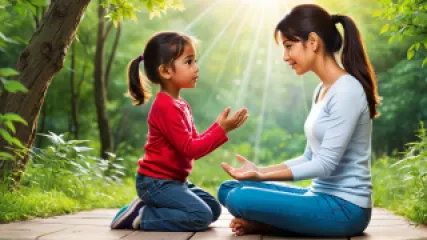Expert Tips: 10 Proven Ways to Help Kids Cope with Anger
Expert Tips: 10 Proven Ways to Help Kids Cope with Anger
Anger is a natural human emotion that everyone experiences, including children. However, when anger becomes overwhelming or unmanageable, it can lead to a range of behavioral and emotional issues. As a parent or caregiver, it's essential to understand how to help children cope with anger in a healthy and constructive way. In this ultimate guide, we'll explore 10 proven strategies that can empower children to manage their anger effectively.
Understanding Childhood Anger
Anger is a complex emotion that can arise for various reasons in children. It may be triggered by frustration, feeling misunderstood, a perceived injustice, or even developmental changes. Children may express their anger through tantrums, aggression, withdrawal, or other disruptive behaviors. It's important to recognize that anger is a normal and necessary emotion, but it's how we manage it that can make all the difference.
When children experience anger, their brains are undergoing a physiological response, often referred to as the "fight-or-flight" reaction. This surge of adrenaline and other hormones can make it challenging for them to think clearly and respond appropriately. As a result, children may resort to impulsive or destructive behaviors, which can further exacerbate the situation.
The Importance of Emotional Regulation
At the heart of helping children cope with anger is the development of emotional regulation skills. Emotional regulation refers to the ability to recognize, understand, and manage one's emotions in a healthy and constructive manner. When children can effectively regulate their emotions, they are better equipped to handle challenging situations, make thoughtful decisions, and maintain positive relationships with others.
Developing emotional regulation skills is a crucial aspect of a child's overall social-emotional development. It not only helps them navigate their own emotions but also fosters empathy, self-awareness, and the ability to interact positively with peers and adults.
10 Proven Ways to Help Kids Cope with Anger
Now that we've established the importance of understanding and managing anger in children, let's explore 10 proven strategies that can help kids cope with this powerful emotion.
1. Teach Emotional Literacy
One of the foundational steps in helping children cope with anger is to teach them emotional literacy. This involves helping them identify, name, and express their feelings in a safe and appropriate manner. Encourage your child to use "I" statements, such as "I feel angry when..." or "I'm feeling frustrated because..." This not only helps them become more self-aware but also fosters communication and understanding within the family.
2. Model Healthy Anger Expression
Children often learn by observing the behavior of their parents and caregivers. It's crucial that you model healthy ways of expressing and managing anger. When you experience anger, demonstrate how to take deep breaths, use calming self-talk, or engage in constructive problem-solving. By showing your child how to handle anger in a positive way, you're providing them with a valuable blueprint for their own emotional development.
3. Establish a Feelings-Friendly Environment
Create a home environment where children feel safe to express their emotions, including anger, without fear of judgment or punishment. Encourage open and honest communication, and make it clear that all feelings are valid and acceptable, even if certain behaviors are not. This allows children to feel heard and understood, which can go a long way in helping them manage their emotions.
4. Teach Coping Strategies
Equip your child with a toolbox of coping strategies they can use when they feel angry. This may include deep breathing exercises, visualization techniques, physical activity, or engaging in a calming hobby or activity. Encourage your child to experiment with different strategies and find what works best for them. Remind them that it's okay to take a break and self-regulate when they're feeling overwhelmed.
5. Validate and Empathize
When your child is experiencing anger, it's important to validate their feelings and show empathy. This doesn't mean you have to agree with their behavior or actions, but it does mean acknowledging their emotions and letting them know that you understand how they feel. Saying something like, "I can see you're really frustrated right now. That must be really hard for you," can go a long way in helping your child feel heard and supported.
6. Encourage Perspective-Taking
Teach your child the valuable skill of perspective-taking, which involves understanding the viewpoints and experiences of others. This can help them navigate conflicts and social situations more effectively, as they learn to consider the feelings and motivations of those around them. Encourage your child to ask questions, see things from different angles, and consider how their actions might impact others.
7. Provide Opportunities for Physical Release
Physical activity can be an excellent outlet for children to release pent-up anger and energy. Engage your child in activities like sports, dance, or outdoor play, where they can channel their emotions in a healthy and constructive way. This not only helps them manage their anger but also promotes overall physical and mental well-being.
8. Foster Positive Relationships
Cultivating strong, supportive relationships can be a powerful tool in helping children cope with anger. Encourage your child to build meaningful connections with trusted adults, such as teachers, coaches, or mentors, who can provide additional guidance and support. Similarly, foster positive peer relationships, as having a strong social network can help children develop empathy, conflict resolution skills, and a sense of belonging.
9. Teach Problem-Solving Skills
Anger is often a reaction to a perceived problem or challenge. By teaching your child problem-solving skills, you can empower them to address the root cause of their anger in a more constructive way. This may involve steps like identifying the problem, brainstorming solutions, evaluating the options, and implementing a plan of action. Guiding your child through this process can help them develop critical thinking and decision-making abilities.
10. Seek Professional Support
In some cases, children may benefit from professional support, such as counseling or therapy, to help them manage their anger more effectively. A mental health professional can provide individualized guidance, offer evidence-based techniques, and work with the entire family to develop a comprehensive plan for addressing the child's emotional needs.
Putting it All Together: A Holistic Approach to Anger Management
Helping children cope with anger is not a one-size-fits-all solution. It requires a holistic, multi-faceted approach that addresses the emotional, social, and behavioral aspects of this complex issue. By incorporating the strategies outlined in this guide, you can empower your child to develop the skills and resilience needed to navigate their anger in a healthy and constructive manner.
Remember, every child is unique, and what works for one may not work for another. Be patient, flexible, and open to trying different approaches until you find what resonates best with your child. With time, practice, and your unwavering support, your child can learn to manage their anger and thrive emotionally.
As you embark on this journey of helping your child cope with anger, keep in mind that it's a continuous process. There will be ups and downs, successes, and setbacks. But by remaining committed to your child's emotional well-being, and by providing a nurturing, understanding, and skills-building environment, you can make a profound and lasting impact on their development.
Remember, you're not alone in this. Reach out to other parents, educators, and professionals for support and guidance. Together, we can create a world where children are empowered to navigate their emotions with confidence and compassion.






